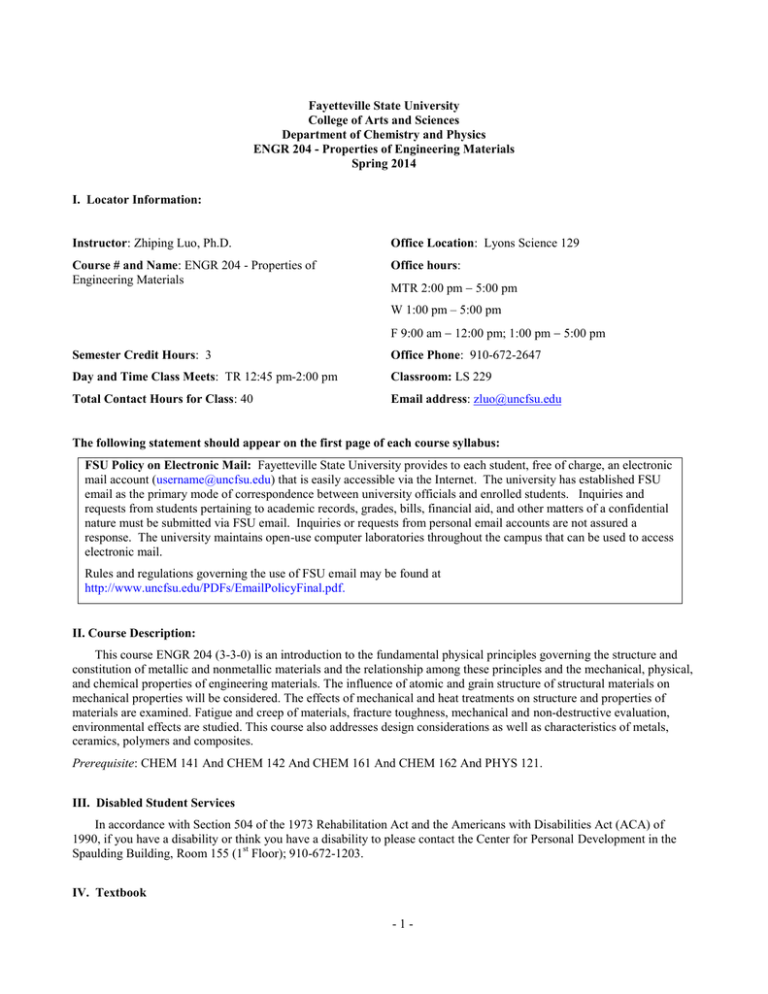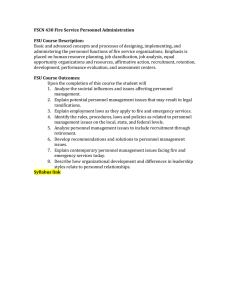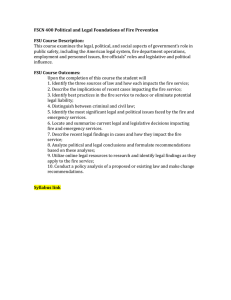ENGR 204 - Fayetteville State University
advertisement

Fayetteville State University College of Arts and Sciences Department of Chemistry and Physics ENGR 204 - Properties of Engineering Materials Spring 2014 I. Locator Information: Instructor: Zhiping Luo, Ph.D. Office Location: Lyons Science 129 Course # and Name: ENGR 204 - Properties of Engineering Materials Office hours: MTR 2:00 pm 5:00 pm W 1:00 pm – 5:00 pm F 9:00 am 12:00 pm; 1:00 pm 5:00 pm Semester Credit Hours: 3 Office Phone: 910-672-2647 Day and Time Class Meets: TR 12:45 pm-2:00 pm Classroom: LS 229 Total Contact Hours for Class: 40 Email address: zluo@uncfsu.edu The following statement should appear on the first page of each course syllabus: FSU Policy on Electronic Mail: Fayetteville State University provides to each student, free of charge, an electronic mail account (username@uncfsu.edu) that is easily accessible via the Internet. The university has established FSU email as the primary mode of correspondence between university officials and enrolled students. Inquiries and requests from students pertaining to academic records, grades, bills, financial aid, and other matters of a confidential nature must be submitted via FSU email. Inquiries or requests from personal email accounts are not assured a response. The university maintains open-use computer laboratories throughout the campus that can be used to access electronic mail. Rules and regulations governing the use of FSU email may be found at http://www.uncfsu.edu/PDFs/EmailPolicyFinal.pdf. II. Course Description: This course ENGR 204 (3-3-0) is an introduction to the fundamental physical principles governing the structure and constitution of metallic and nonmetallic materials and the relationship among these principles and the mechanical, physical, and chemical properties of engineering materials. The influence of atomic and grain structure of structural materials on mechanical properties will be considered. The effects of mechanical and heat treatments on structure and properties of materials are examined. Fatigue and creep of materials, fracture toughness, mechanical and non-destructive evaluation, environmental effects are studied. This course also addresses design considerations as well as characteristics of metals, ceramics, polymers and composites. Prerequisite: CHEM 141 And CHEM 142 And CHEM 161 And CHEM 162 And PHYS 121. III. Disabled Student Services In accordance with Section 504 of the 1973 Rehabilitation Act and the Americans with Disabilities Act (ACA) of 1990, if you have a disability or think you have a disability to please contact the Center for Personal Development in the Spaulding Building, Room 155 (1st Floor); 910-672-1203. IV. Textbook -1- Kenneth G. Budinski, Michael K. Budinski. Engineering Materials: Properties and Selection. Prentice Hall, 2010. ISBN-10: 0137128428. V. Student Learning Outcomes Learning Outcomes Describe how to measure the mechanical and physical properties. Recognize different types of materials, including metals and alloys, ceramics, polymers, and composites. Compare the properties of different types of materials. Specify the major applications of different types of materials. Assessments Homework, quizzes, and tests. Homework, quizzes, tests and project. Homework, quizzes, and tests. Homework, quizzes, and tests. VI. Course Requirements and Evaluation Criteria a. Grading Scale The final letter grade assigned to the student will be based upon the following numerical equivalencies. A = 90% – 100% Excellent B = 80% – 89% Proficient C = 70% – 79% Acceptable D = 60% – 69% Poor F = 59% or less (failure) Unacceptable b. Attendance Requirements: Students are required to attend all lectures and labs on time. c. Assignments and Point Distribution (1) Homework and Quiz (20%): Students will take homework assignments (10%) and classroom or online quizzes (10%). The homework should be turned in in the following class except specifically assigned. (2) Project Assignment (40%): Students are required to complete a project on the structure or properties of any interested engineering materials. Laboratory equipment will be provided as needed. (3) Module and Final Tests (40%): There are Module I (10%), Module II (10%) and final test (20%). The final test will cover all material presented in the course. d. Policy on Missed or Late Assignments Any late assignment is penalized 30% of the whole points. Any missed assignment receives 0 point. e. FSU Policy on Disruptive Behavior in the Classroom (Optional) The Code of the University of North Carolina (of which FSU is a constituent institution) and the FSU Code of Student Conduct affirm that all students have the right to receive instruction without interference from other students who disrupt classes. FSU Core Curriculum Learning Outcome under Ethics and Civic Engagement (6.03): All students will “prepare themselves for responsible citizenship by fulfilling roles and responsibilities associated with membership in various organizations.” Each classroom is a mini-community. Students learn and demonstrate responsible citizenship by abiding by the rules of classroom behavior and respecting the rights all members of the class. The FSU Policy on Disruptive Behavior (see FSU website for complete policy) identifies the following behaviors as -2- disruptive: 1. 2. 3. 4. 5. 6. 7. 8. 9. Failure to respect the rights of other students to express their viewpoints by behaviors such as repeatedly interrupting others while they speak, using profanity and/or disrespectful names or labels for others, ridiculing others for their viewpoints, and other similar behaviors; Excessive talking to other students while the faculty member or other students are presenting information or expressing their viewpoints. Use of cell phones and other electronic devices Overt inattentiveness (sleeping, reading newspapers) Eating in class (except as permitted by the faculty member) Threats or statements that jeopardize the safety of the student and others Failure to follow reasonable requests of faculty members Entering class late or leaving class early on regular basis Others as specified by the instructor. The instructor may take the following actions in response to disruptive behavior. Students should recognize that refusing to comply with reasonable requests from the faculty member is another incidence of disruptive behavior. 1. 2. 3. 4. 5. 6. Direct student to cease disruptive behavior. Direct student to change seating locations. Require student to have individual conference with faculty member. At his meeting the faculty member will explain the consequences of continued disruptive behavior. Dismiss class for the remainder of the period. (Must be reported to department chair.) Lower the student’s final exam by a maximum of one-letter grade. File a complaint with the Dean of Students for more severe disciplinary action. Students who believe the faculty member has unfairly applied the policy to them may make an appeal with the faculty member’s department chair. VII. Academic Support Resources Blackboard: http://blackboard.uncfsu.edu/ Instructor Website: http://www.uncfsu.edu/chemistry/faculty-and-staff/zhiping-luo VIII. Course Outline and Assignment Week Content 1. Introduction 2. Crystal structure 3. Forming engineering materials 4. Chemical properties 5. Physical properties 6. Mechanical properties 7. Mechanical properties 8. Review and module I test 9. Polymer and properties 10. Ceramics and properties 11. Iron and steels and their properties 12. Alloys and properties I Module Module I: Fundamentals Module II: Properties of engineering materials -3- IX. 13. Alloys and properties II 14. Nanomaterials and properties 15. Review and module II test 16. Review and Final Test Final Test Teaching Strategies The course includes lectures, homework, quizzes, projects, reviews and tests. The instructor will provide the lab guidelines, and the students should follow up the procedures in the lab. X. Bibliography 1. Kenneth G. Budinski, Michael K. Budinski. Engineering Materials: Properties and Selection. Prentice Hall, 2010. ISBN-10: 0137128428. -4-



